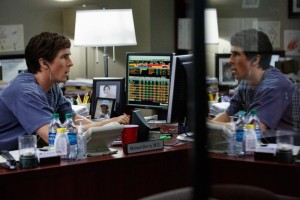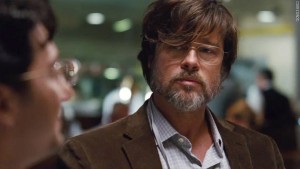
Ready for a dark comedy about the high stakes rollers behind the housing market and sub-prime mortgages? Well, you probably weren’t clamoring for it, but The Big Short is a very pleasant surprise. The film manages to entertain and enlighten despite some exceedingly dry subject matter thanks to a great cast and some amusing storytelling tricks.
 Based on the book by Michael Lewis (who also wrote Moneyball), the film details the housing crash of 2008. Specifically, the plot follows several independent parties within the financial world. Privately, they all investigate the unusual hedge funds and housing bonds being created by many of the big banks to bolster the market. Despite being laughed at, these men bet against these institution’s collateralized debt bubble, hoping to reap their own rewards when mortgage payments begin to default.
Based on the book by Michael Lewis (who also wrote Moneyball), the film details the housing crash of 2008. Specifically, the plot follows several independent parties within the financial world. Privately, they all investigate the unusual hedge funds and housing bonds being created by many of the big banks to bolster the market. Despite being laughed at, these men bet against these institution’s collateralized debt bubble, hoping to reap their own rewards when mortgage payments begin to default.
Of course, each person involved has different and sometimes very personal incentives. Jared Vennett (Ryan Gosling) is motivated by pure profit, but Mark Baum (Steve Carell) sees it as an opportunity to uncover corruption within the banking institutions. Additionally, a socially awkward fund manager named Michael Burry (Christian Bale) and a retired trader Ben Rickert (Brad Pitt) also note the bizarre activities and get in on the action.
This concept doesn’t exactly exude a great deal of cinematic potential. There is heavy and detailed exposition needed to explain the complicated and convoluted deals being made by the banks. Thankfully, director Adam McKay effectively solves this problem by having guest speakers pop up to explain the various concepts in layman’s terms (and in the process add more humor to the film). These sequences work well and are incredibly helpful in clarifying important terms while keeping the narrative moving at an entertaining clip.
In fact, the film’s sense of humor is its biggest asset. Even when there is tension, it’s often played to comic effect. The characters are frequently berated and told that what they’re doing is crazy by various parties. These and other moments lead to arguments with some strong verbal zingers and cultural references that add plenty of levity to the story. Bale is the standout as Burry, whose oddness is very apparent and at times amusing, but is never played in a mocking manner.
 Admittedly, there are a few creaks. Carell takes some getting used to in the role of the loud and gruff Baum, although by the halfway mark he becomes more relatable. Early in the movie, Baum doesn’t seem as prominent, but he eventually morphs into the lead character. Obviously, the fact that this is all based on a true story means that a simpler and more traditional narrative isn’t going to be possible, but one does start to miss the other roles that fall by the wayside. And visually the movie attempts to move the camera around in a way that’s perhaps too reminiscent of Martin Scorsese. It’s not used as gracefully and sometimes comes across as The Wolf of Wall Street-lite.
Admittedly, there are a few creaks. Carell takes some getting used to in the role of the loud and gruff Baum, although by the halfway mark he becomes more relatable. Early in the movie, Baum doesn’t seem as prominent, but he eventually morphs into the lead character. Obviously, the fact that this is all based on a true story means that a simpler and more traditional narrative isn’t going to be possible, but one does start to miss the other roles that fall by the wayside. And visually the movie attempts to move the camera around in a way that’s perhaps too reminiscent of Martin Scorsese. It’s not used as gracefully and sometimes comes across as The Wolf of Wall Street-lite.
But these are very minor qualms. This is still a surprising and interesting film that uses humor to subtly instill its themes. Yet it doesn’t pull any punches with its treatment of the banks and in the end will leave many viewers incensed by the actions of several executives – something important for a film to have a lasting impact. As a result, The Big Short is about as successful as a project like this can be and will ultimately pay its viewers dividends.


